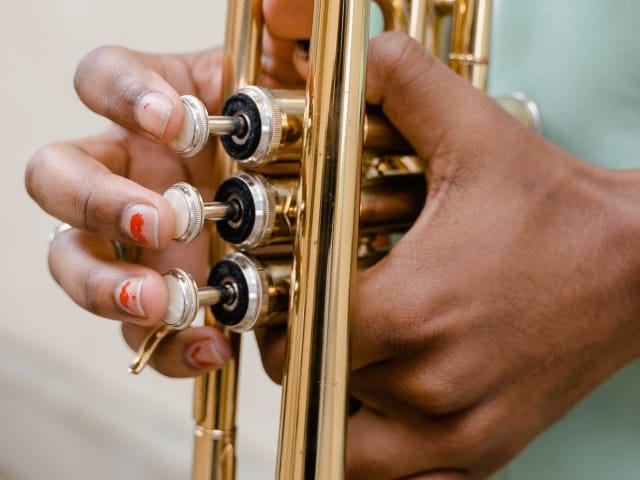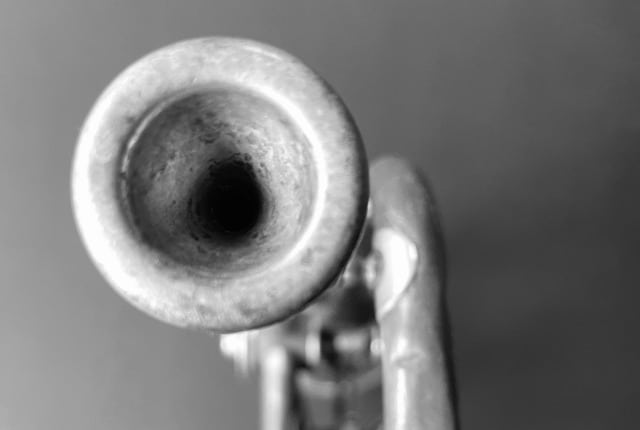You want to play higher notes on your trumpet but you’re struggling to get there? Read on to find out how to increase your register, which mouthpiece can help you and how long it’ll take for you to get really good.
What is the highest possible note on a trumpet?
As there are different types of trumpets, there are also different ranges for each. Some trumpets naturally can reach higher notes than others. In the case of a standard B♭ trumpet, any notes played up to the highest G can be played with confidence. However, notes above this G can also be played. Notes played higher than the top G can suffer from poor tone and can be straining if overused.
How do you increase your higher register on a trumpet?
A common misconception is that you need to blow harder when trying to play higher notes. Blowing harder may increase the volume, but it does not increase the range when playing. To increase your higher register on a trumpet, you need to produce a higher pitch with your lips. This is by having your lips tighter against the mouthpiece which produces a higher sound.

How long does it take to play high notes on trumpet?
This can depend a lot on each player and their amount of experience. The best way to play high notes as soon as possible is to practice everyday. This will make sure that you are getting slightly better day after day so that in the long run you will be much better than where you are today.
Along with general trumpet practice, there are also certain practice techniques designed to help increase range and make it easier to play high notes. Such practices are listed at the bottom of the article. If you want to start playing higher notes sooner, the right mouthpiece can also help.
Does trumpet mouthpiece make a difference when playing high notes?
Different mouthpieces can make a noticeable difference when playing high notes: Larger mouthpieces can make it harder to play higher notes as it is harder to stretch your lips tightly against them. Smaller mouthpieces make it easier to play higher notes as it is easier to stretch your lips across compared to a normal-sized mouthpiece.
A normal mouthpiece is between the large and small mouthpiece making it easier to hit higher notes than a large one, but harder than a small one. The right mouthpiece simply should not be understated when it comes to playing high notes. Click here to see our complete guide to mouthpieces.
Looking for a teacher?
Want to get lessons at the comfort of your own home? Check out the course Learn to Play the Trumpet: Beginner to Pro Made the Easy Way* on Udemy! (See their full trumpet course line-up here*!)
Which trumpet mouthpiece is best for high notes?
A small mouthpiece is always the best when trying to play high notes. As previously mentioned, small mouthpieces naturally stretch your lips which makes it easier to produce higher sounds. Of course you can reach similar notes on a normal mouthpiece, but it will be harder for most players. A large mouthpiece is strongly advised against when playing high notes as they are more suited for low notes.
These mouthpieces are recommended for playing high notes:
- Schilke 14A4A*
- Schilke 13A4a*
- Bob Reeves 43C* – Nice bright timbre and a loud upper register.
- Mark Curry 3C

How can I get my trumpet range up fast?
The best way to get your trumpet range up fast is dedicated practice. Here are some practices you can do:
1. Work your way up gradually
Start at a comfortable middle note and gradually work your way up the notes to the highest you can go. By doing this, you can feel when you begin to struggle and what note you stop at.
A good idea is to write this down in a notebook so that you can try to beat it next time and improve. It is preferable to work up the notes instead of playing a high note by itself.
2. Stretch your lips
Take your trumpet mouthpiece from your trumpet and try to stretch your lips tightly across it. Then blow to produce a buzz sound. This helps as you can practice blowing with your lips tight without having to focus on playing any notes on the trumpet.
Getting your lips tight enough is a skill that can be hard to master and this is one of the best ways of practicing this. Try doing this everyday for 15 minutes and pay dedicated attention to your lips.
3. Practice endurance
Practice endurance by trying to hold a single note as long as you can. This improves endurance which can help immensely when trying to reach higher notes.
Set a stopwatch for a time you think is reasonable for your abilities and then play a single note until the buzzer beeps. Try to practice this everyday and increase the stopwatch time every few days so that you are always getting better.
4. Keep an upright posture while playing.
This is important as it creates a direct line from your lungs to your mouth. This improves your airflow and endurance to hit high notes. Try practicing in front of a large mirror to check your posture while you practice. Make sure that your spine is straight and that your shoulders are back.
5. Practice daily
Finally, general daily practice on your trumpet will better your abilities in all areas of trumpet playing.
TrumpetHub.com is a participant of the Amazon Services LLC Associates Program, an affiliate advertising program. Links marked with an asterisk (*) are affiliate links. If you buy a product through an affiliate link, we will get a small commission without extra cost to you. This helps us earn an income off the free content we provide to you. Thank you for your support!
Trumpet photo by MART PRODUCTION from Pexels.






